Please Note:
I no longer offer 1:1 nutrition or functional health services, and I’m not accepting new clients for digestive or hormone-related support.
This blog remains published as a helpful resource for women navigating these health challenges — especially those looking for clarity around their symptoms and well-being.
Today, my work is dedicated to helping Health Coaches, Practitioners, and Wellness Entrepreneurs grow profitable, sustainable businesses through private practice coaching and mentorship.
If you’re a health and wellness professional who’s ready to grow a thriving, values-aligned business without burning out, click here to learn more about my coaching programs.
Thank you for being here and I wish you the best on your journey.
Last week I discussed how coffee may not be the best option to boost energy levels and keep your hormones happy.
This is especially true for slow metabolizers of caffeine and those who suffer from HPA axis dysfunction or “adrenal fatigue”.
But, ditching your morning coffee ritual can be hard. Really, really hard.
Trust me, I have this debate with myself nearly every morning I wake up feeling groggy from a disrupted night of sleep.
(Hey, I’m not perfect!)
The transition to a coffee free morning can be bearable and even enjoyable when you find the right coffee replacement.
That’s why high quality tea is a great alternative to coffee, especially for women with hormonal imbalances.
And tea may be a better beverage option than coffee since it’s lower in caffeine (some herbal teas have no caffeine) while still maintaining a high level of polyphenols.
Unlike some of coffee’s hormone disturbing properties, tea can have a positive effect on hormones.
In this post, I’ll share 5 major ways tea can help balance your hormones. (And here’s the tea brand that I’m loving lately.)
Keep reading to learn more!
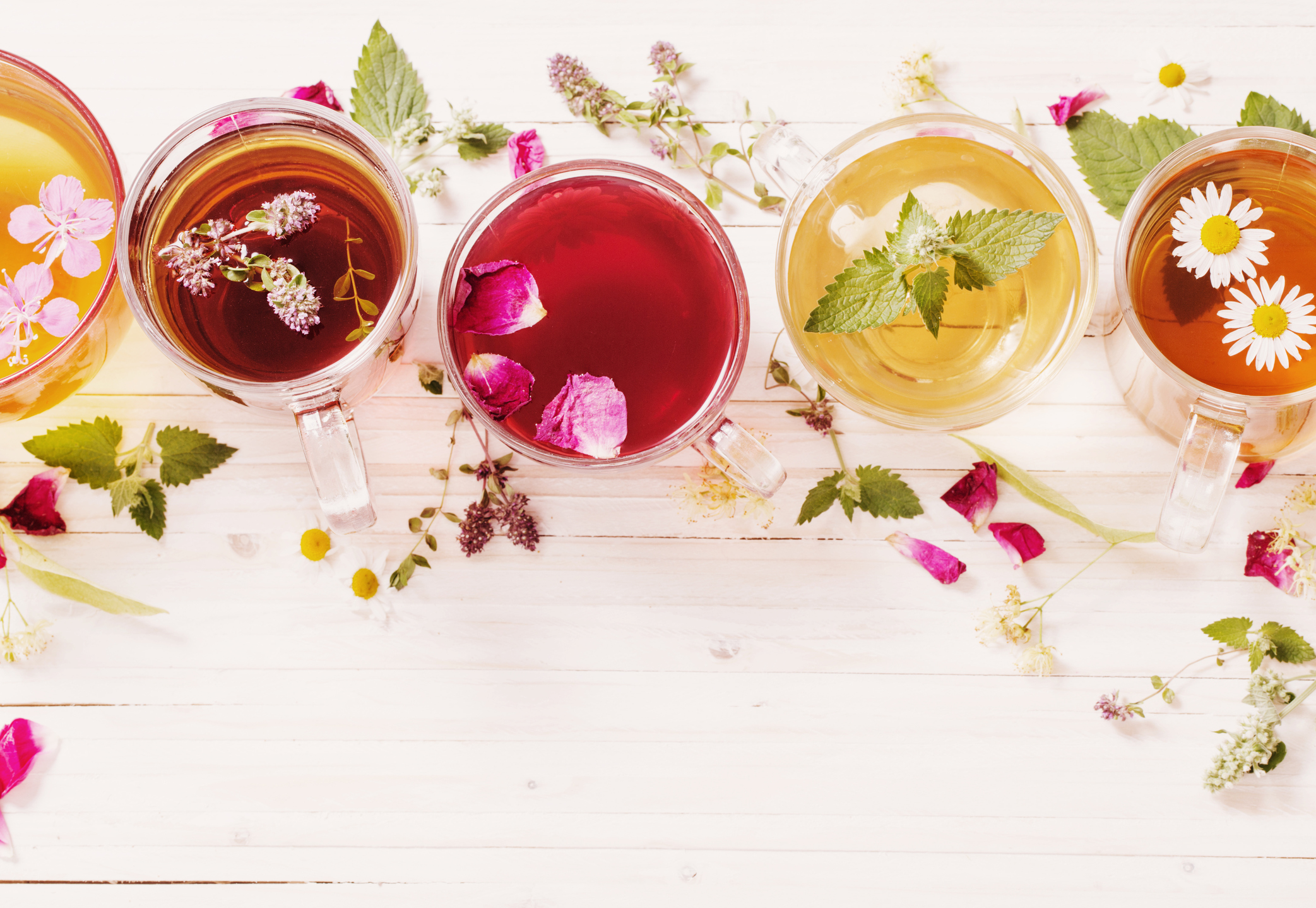
5 Ways that Tea Can Help Your Hormones
1. Tea may lower stress and anxiety
Adding tea into your daily routine can build your stress tolerance and help lower anxiety.
Unlike the jitters that can come when you drink coffee, drinking tea is usually accompanied by a feeling of relaxation and calm. You can thank L-theanine for this calming effect!
L-theanine is an amino acid that is found in high amounts in tea, especially green tea. L-theanine’s anti-stress effects are thought to be a result of it’s structural similarity to glutamate, an amino acid that has an excitatory effect in the nervous system. L-theanine can bind to glutamate receptors, inhibiting its action in our cells.
Research involving L-theanine administration in animals has demonstrated other neurochemical changes that could explain its calming effects. L-theanine is associated with an increase in the brain’s levels of GABA and dopamine.
GABA is an inhibitory neurotransmitter and is tasked with calming our brains down. A deficiency in GABA leads to feelings of anxiety, worry, and being overwhelmed. The GABA-boosting effects of L-theanine can calm racing thoughts and feelings of stress.
L-theanine also boosts dopamine levels, which promotes feelings of pleasure, boosts motivation, and keeps us focused. Low levels of dopamine will make you feel flat, unmotivated, and even depressed.
How L-theanine Helps with Stress
L-theanine supplementation also lowers cortisol levels and perceived stress. One study had participants drink a L-theanine containing drink prior to performing a cognitive stress test. Participants who consumed the drink had significantly lower reported stress following the test, and lower cortisol levels 3 hours after the test.
An additional study examined the effects of L-theanine supplementation on stress levels in pharmacy students before and during a stressful training period.
The study used salivary alpha amylase levels and reported stress levels to measure the stress response in their subjects. (Salivary alpha amylase is an enzyme that raises when the sympathetic nervous system or the stress response is activated.)
The study found that pre-practice alpha amylase levels and reported stress were lower in the L-theanine group compared to the placebo group. The researchers suggest L-theanine suppressed the initial stress response to the stressful event.
In simple terms, the L-theanine made the students more resilient to stress.
L-theanine from tea also seems to blunt the negative physiological effects of caffeine. A study found that caffeine combined with l-theanine lessened the negative effects on blood flow, mood, and cognition compared to caffeine consumed alone.
And L-theanine isn’t the only compound in tea that can reduce cortisol. EGCG (Epigallocatechin-3-gallate), a compound found in tea, has a potent inhibitory effect on the enzyme that activates cortisol from the inactive cortisone.
By lowering stress hormones, EGCG can also have a calming effect on tea drinkers.

2. Tea has polyphenols that promote gut health
Tea can be a great dietary tool to keep both your gut bugs and hormones healthy!
Wondering how?
Healthy hormone levels requires a healthy gut. Polyphenols in tea can help keep your gut happy, which in turn will keep your hormones happy.
Polyphenols are phytochemicals found in plant foods that have a prebiotic effect on our gut bacteria. They have been shown to increase the growth of a good bacteria like Akkermansia, Bifidobacteria and Lactobacillus.
These good gut bugs help restore or maintain balance in the gut microbiome, preventing the growth of pathogens that can cause hormone imbalance. Many of my clients with hormone imbalances are truly dealing with a gut dysbiosis issue at the root level.
There are bacteria in our gut that strongly affect estrogen metabolism. Estrogen metabolizing bacteria are collectively referred to as the “estrobolome”.
Bacteria that make up the “estrobolome” produce an enzyme called beta-glucoronidase. This enzyme activates and frees estrogen, allowing it to be recirculated in the body instead of being excreted. Too much beta-glucoronidase can lead to high levels of estrogen and estrogen dominance.
An imbalanced gut can also lead to poor gut integrity. As the gut barrier starts to breakdown, toxic bacterial byproducts can enter the blood stream, which initiates an inflammatory response. This inflammation activates the HPA axis, raising cortisol levels.
The chronic stress triggered by pathogenic gut bacteria can then start down-regulating other hormones, such as thyroid and sex hormones. A healthy and diverse microbiome can prevent this by maintaining a strong intestinal barrier.
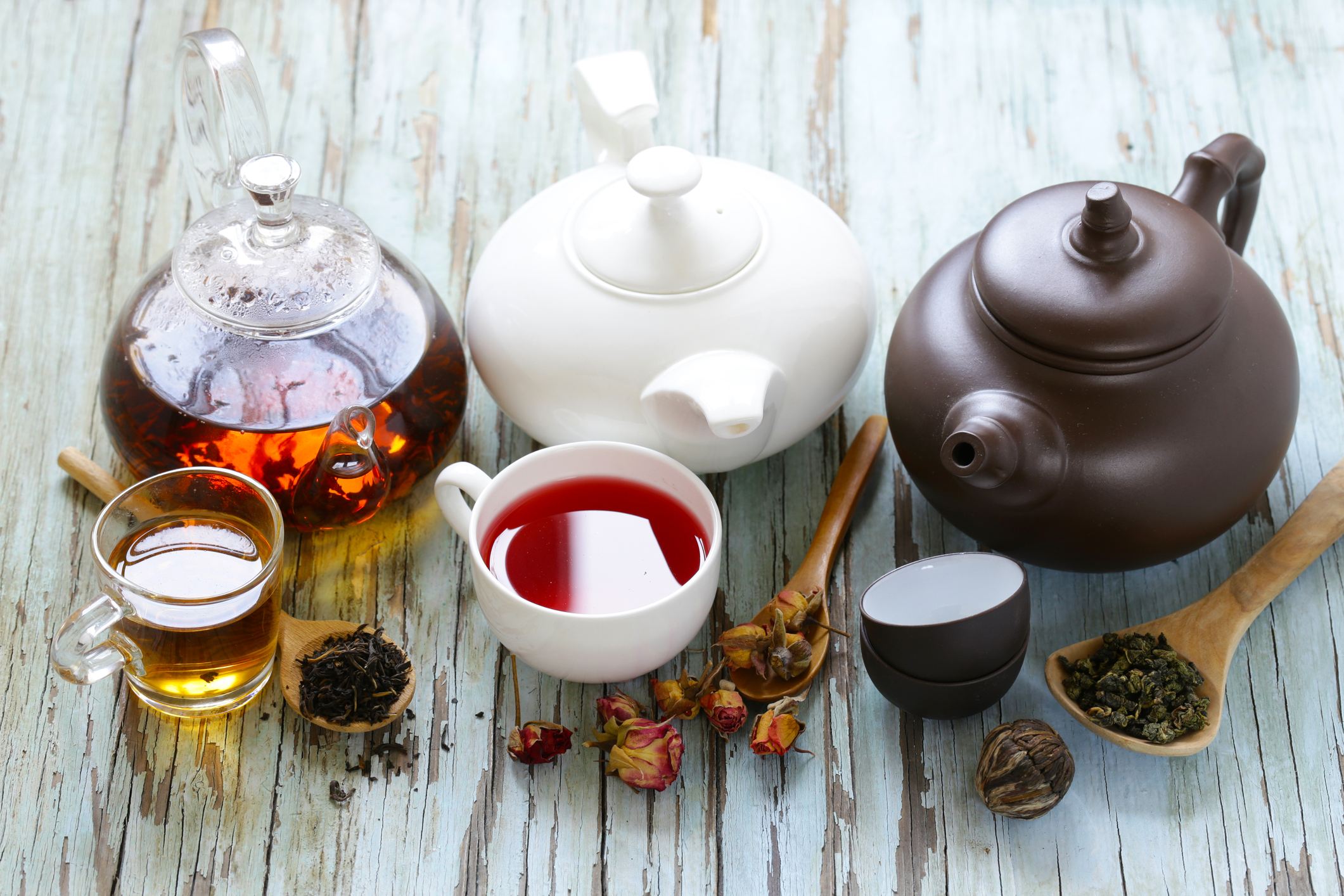
Would you like to save this post?
Your email address is 100% safe and will never be sent spam.
3. Tea has antioxidants that lower inflammation
Modern lifestyles filled with junk food, sleepless nights, low sunlight exposure, and chronic stress have left many Americans highly inflamed! Poor lifestyle habits and chronic stress drive oxidative stress in our cells, leading to cellular damage.
Oxidative stress occurs when the amount of free radicals surpasses the number of antioxidants available in the body. Free radicals are molecules in the body that are highly reactive because they are missing an electron.
This missing electron makes them unstable until they steal another electron from neighboring cells. These neighboring cells are forced to steal electrons from other cells. This can lead to a vicious cycle of cell damage and unprogrammed cell death.
Antioxidants donate electrons to free radicals, stabilizing them and ending their path of cellular destruction. Inflammation results when free radicals out number antioxidants, and the destructive cycle continues.
Inflammation in the body increases the production and circulation of pro-inflammatory cytokines. Chronic activation of these cytokines can have harmful effects on hormones and your overall health.
Cytokines are potent activators of the HPA axis, leading to dysregulation of sex and thyroid hormones.
Tea is loaded with polyphenols that will help maintain hormonal harmony by calming excess inflammation with powerful antioxidants.
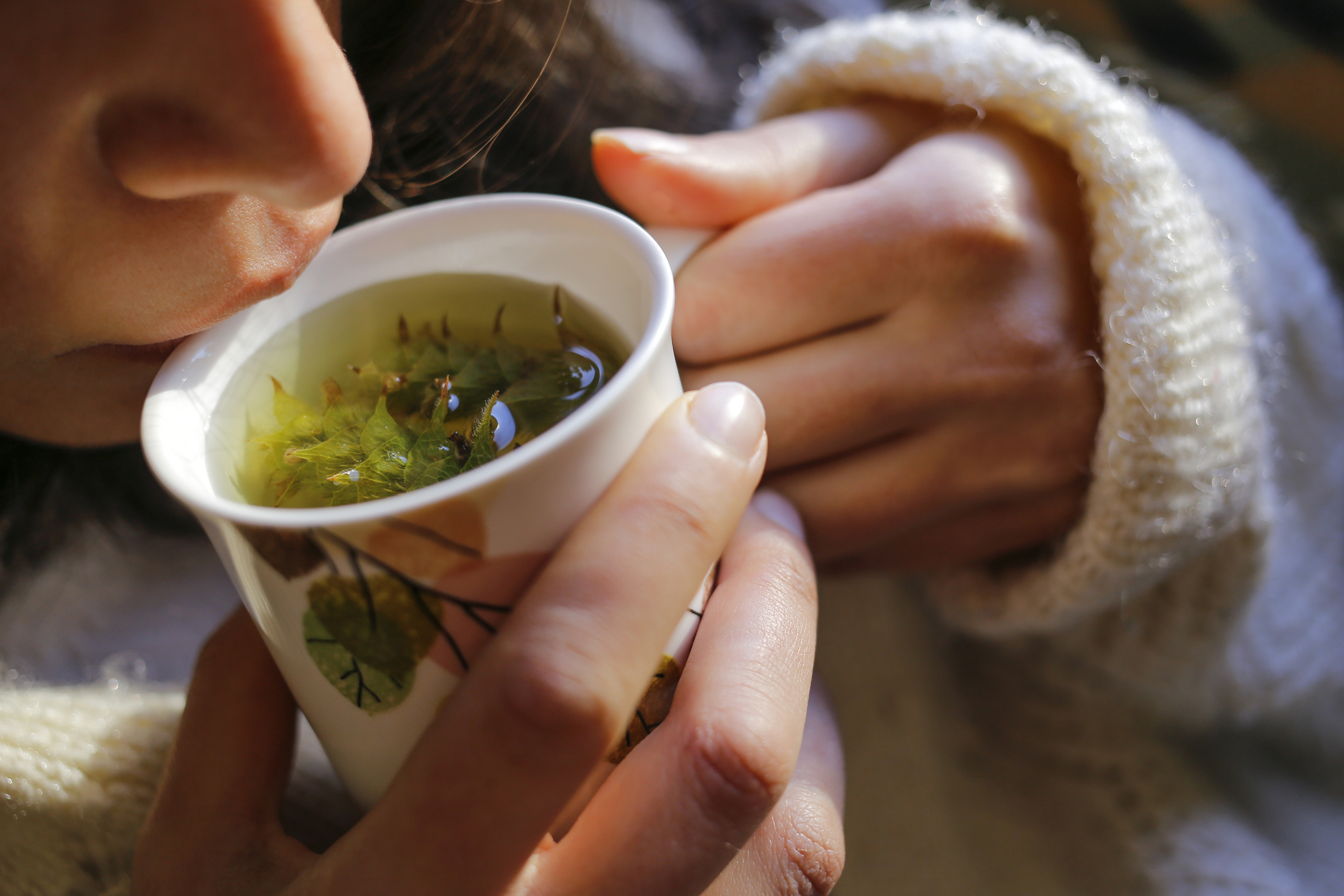
4. Tea improves PCOS symptoms
Tea may be a great addition to your PCOS treatment. Research has shown significant positive effects of green tea in PCOS treatment.
PCOS is typically characterized by high androgen levels, and frequently seen with low estrogen and progesterone levels. This imbalanced hormonal profile results in a failure to ovulate and infertility, among other symptoms.
There are three major ways that tea can help with PCOS.
First, tea has been shown to have anti-androgenic effects. EGCG not only helps reduce stress, but it also appears to blunt the androgen receptor, preventing it from producing androgens.
One study found that drinking spearmint tea twice daily for one month resulted in significantly lower testosterone levels and higher LH and FSH in woman with PCOS compared to the control group who wasn’t drinking the tea. These positive hormonal changes can promote the production of estrogen and progesterone, which could restore ovulation.
Second, tea increases the production of sex hormone binding globulin (SHBG). Hormones must be free to be used by the cells. SHBG can bind to hormones leaving less available free hormones to be used by the cells.
SHBG can bind to excess testosterone preventing it from being used by your cells. It can also bind to estrogen, but it has a much stronger affinity towards androgens like testosterone. Lower testosterone levels can help improve many PCOS symptoms.
Third, green tea has been shown to help lower inflammation and insulin resistance in animals with PCOS. Blood sugar instability is a hallmark characteristic of PCOS. Green tea appears to be able to improve insulin sensitivity by reducing oxidative stress!
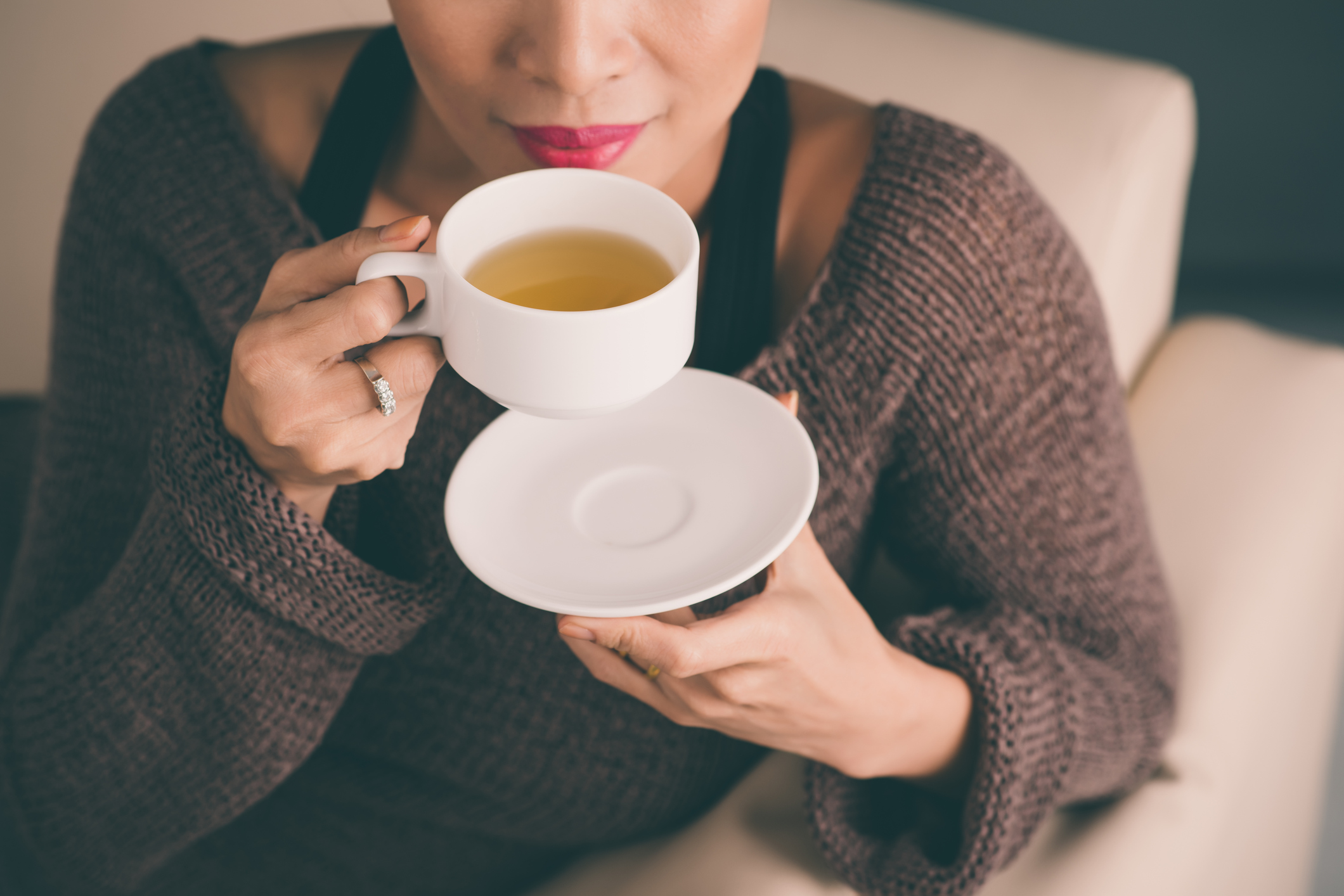
5. Green Tea may reduce Estrogen Dominance
The symptoms of estrogen dominance occur when there is excess estrogen and not enough progesterone in the luteal phase of your ovarian cycle. This imbalance is a common cause of PMS symptoms.
While there aren’t any studies looking at estrogen dominance specifically, there is evidence that green tea intake is associated with lower estrogen levels in post-menopausal women.
It’s thought that lower estrogen levels in green tea drinkers are a result of green tea polyphenol’s ability to inhibit aromatase, the enzyme responsible for converting androgens to estrogens. The increase in SHBG may play a minor role in lowering estrogen levels as well.
Those with estrogen dominance can try adding green tea into their routine to help lower estrogen levels and reduce symptoms of excess estrogens.
Drink Tea for Happy Hormones!
Tea can help you become more resilient to stress, keep your gut healthy, lower inflammation and help boost hormone metabolism. All of these functions make tea a great tool to help keep your hormones in harmony.
Now that you know why tea is so good for your hormones, the next question is what kind of tea should you drink?
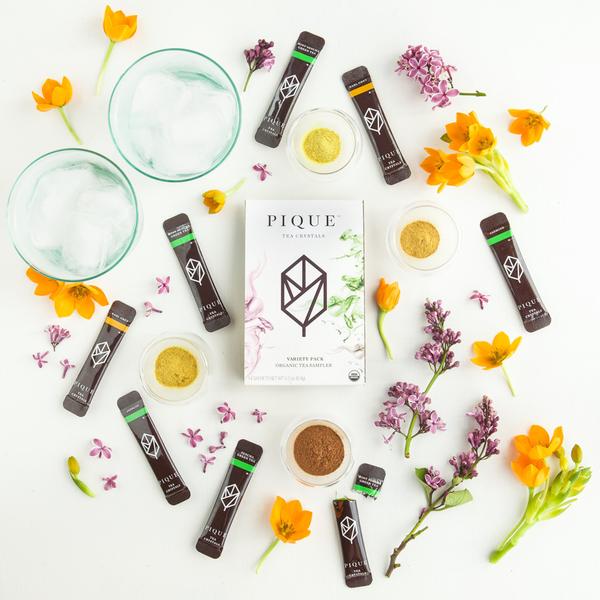
Image Credit: SouveNEAR [https://store.souvenear.com/]
Why I recommend Pique tea
I drink tea on a regular basis. Sometimes even 2-3 cups a day!
I prefer the gentle sustained energy boost I get from tea, without the jitters that comes with drinking coffee. I’m personally sensitive to caffeine, and it’s easy for me to overdo it when drinking coffee.
Plus, good quality tea is a delicious, soothing way to start my morning. A good cup of tea rivals good coffee any day!
For healthy, incredible tasting tea, I personally recommend Pique Tea.
It’s the highest quality and simplest to prepare tea I have ever tried. And Pique tea is potentially the most nutrient dense tea on the market!
What makes Pique Tea truly unique is their state-of-the-art tea crystals. Pique tea developed a patented Cold Brew Crystallization process that uses low temperature brewing to lock the maximum level of antioxidants in crystal form.
In addition, the creators of Pique Tea spent thousands of hours finding premium organic ingredients from the best farms around the world.
Benefits of Pique Tea
Pique Tea is a superior quality tea and meets the highest level of health criteria. Pique Tea:
- Delivers up to 12x the antioxidants of regular tea
- Is triple screened for mycotoxins, pesticides and heavy metals
- Is made from the highest quality tea leaves that are organic, sugar-free and free of additives
- Dissolves in cold or hot water in a matter of seconds
- Is great for travel and when you are on-the go
If you are planning using tea to restore or maintain healthy hormone levels, I highly recommend using Pique Tea!
How to Prepare Pique Tea
My favorite way to prepare the tea is to use my Cuisinart Perfect Temp Electric Kettle to heat the water to 165-185 degrees depending on the tea variety I’m choosing. (Green tea is best at 175 degrees or less.)
Once the water is ready, I pour the crystals into a mug and pour in about 8 ounces of hot water. I frequently add some local honey as well, or cream if I’m using a black tea. It takes mere seconds to be ready to drink!
My favorite flavors at Pique are their jasmine green tea, the Earl Grey tea, and their passionfruit green tea.
They are incredibly fragrant and don’t have that weird grassy taste that many other green teas have. The jasmine tea smells like I’m drinking flowers, no joke!
I love Pique Tea and I definitely recommend you try them out if you want an easy-to-prepare, hormone-happy beverage in the morning.
Use THIS LINK to purchase your tea and get up to 3 free boxes of tea when you order!
Now tell me, do you drink tea instead of coffee? Have you tried Pique? Share your thoughts in the comments below!

Affiliate Disclosure: In order to support my business and website(s), I may receive monetary compensation or other types of remuneration in exchange for endorsements, recommendations, testimonials and/or links to any products or services from this site. I only recommend products that I myself have used and trust. No additional costs are passed to you for your purchase of a product through an affiliate link.
Laura Schoenfeld / Ancestral Nutrition, LLC is a participant in the Amazon Services LLC Associates Program, an affiliate advertising program designed to provide a means for sites to earn advertising fees by advertising and linking to Amazon.com.
This post may contain affiliate links. If you click on a link and make a purchase, I may receive a small commission.
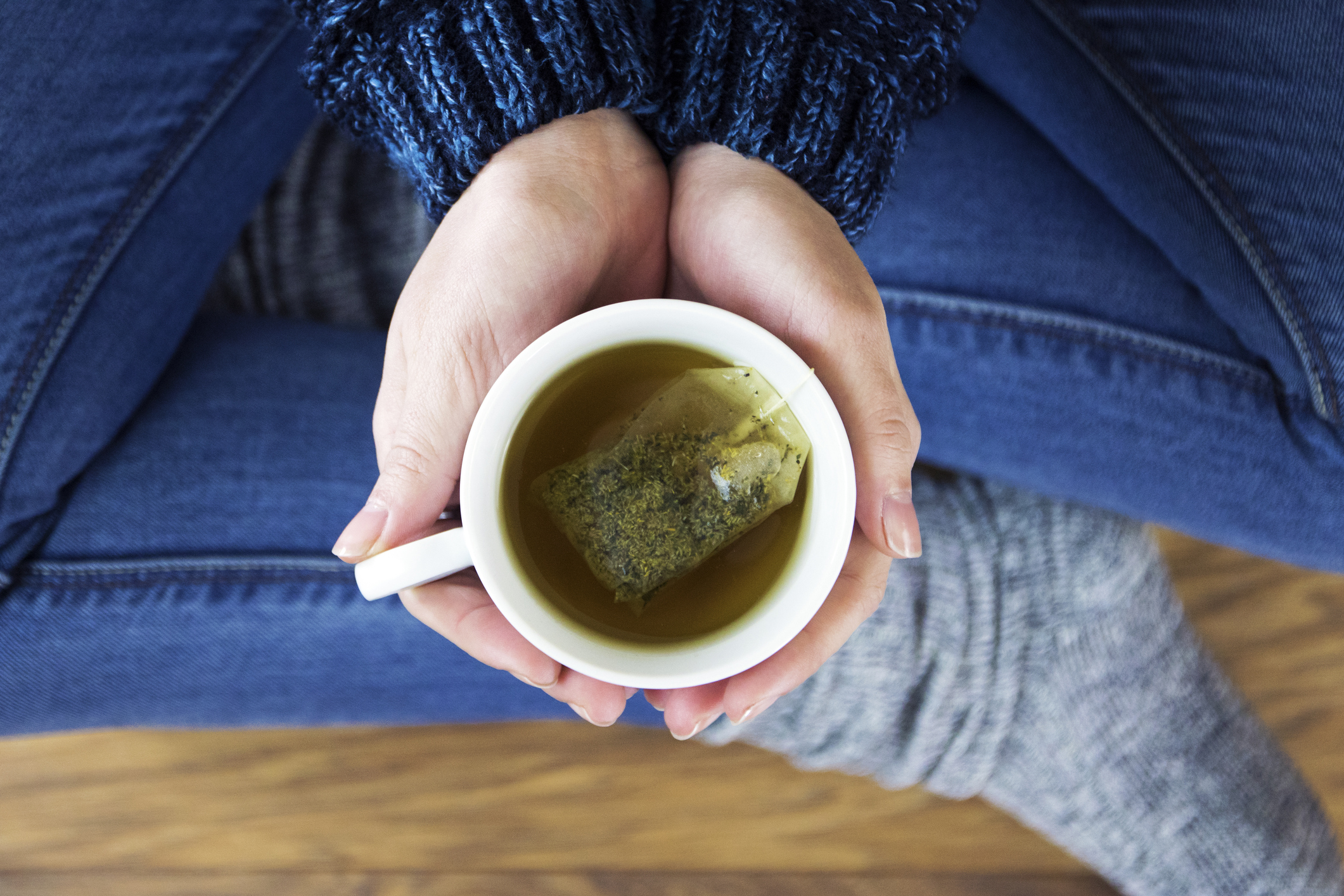
+ show Comments
- Hide Comments
add a comment